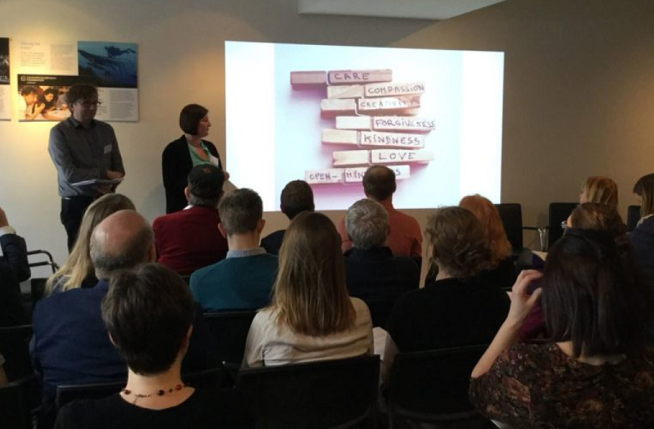Co-creation explored: New models of arts commissioning by communities

Over 50 arts funders, policy makers, Big Local community members, academics and interested practitioners attended our joint event with Local Trust on 20 March to explore co-creation, and models of arts commissioning led by local communities. The event examined how communities can work together creatively to develop a shared vision for change in their area, and partner with arts organisations to help them achieve that vision. This topic is a key theme of our Inquiry into the Civic Role of Arts Organisations.
The event marked the start of a partnership between the Calouste Gulbenkian Foundation (UK Branch) and Local Trust to support arts commissioning that puts local people firmly in control of their own cultural development. Big Local is a ground-breaking programme managed by Local Trust and funded by the Big Lottery Fund that has given 150 local areas across England at least £1m each to use as they think best to make their areas better places to live.
Many Big Local groups have chosen to include arts and cultural activities as an important component of their programme, and the range of arts activities underway in Big Local is phenomenal. It includes choirs, craft clubs, yarn bombers, community galleries, dance sessions and music making, and large-scale creative events such as carnivals and festivals. Arts organisations are also working in local neighbourhoods to bring people together and initiate wider social, cultural or environmental change.
In his introduction to the event, Andrew Barnett, director of the UK Branch of the Calouste Gulbenkian Foundation, stressed “the immense power of culture” in developing communities and bridging divides. He welcomed the opportunity to gain insight into real practice on the ground through the event’s case studies.
The audience was treated to three inspiring examples of community commissioning in practice. Tim Corum from the Horniman Museum spoke about the museum’s innovative Studio Collective, a collaboration between community partners, an artist and Horniman staff, which organises thought-provoking exhibitions and public events. Studio Collective member Phil Baird explained how a cultural organisation had taken on the role of a ‘village square’ by bringing together the community to collaborate and share ideas.
Cara Thorpe from Newington Big Local and Tom Andrews from People United spoke about their collaborative project ‘The Best of Us’. The project celebrates positive news stories in Newington which reflect the best of people in the community and uses these as a catalyst for change. The final case study was Appetite Stoke. Project director Karl Greenwood explained how the project has worked closely with artists and communities to bring a diverse programme of arts events to over 370,00 people across Stoke-on-Trent.
The presentations were followed by responses from Laura Dyer (Arts Council England), Liz Morton (Battersea Arts Centre) and Matt Leach (Local Trust/Big Local). Laura explained how the Arts Council is now challenging itself to share its power. She urged arts organisations to become better listeners to create true dialogues with communities.
Reflecting on best practice, Liz argued that arts organisations must amplify the vision and voices of communities. She cited The Agency, a project supported by the Foundation that uses creative processes to help young people to develop social businesses, as an example of best practice. Matt stressed that the vision and ambition of the community must be at the heart of co-creation projects.
The debate touched on many of the challenges and opportunities identified in our report Rethinking Relationships, such as working with communities at a deep level, and the need for flexible funding systems.
The event highlighted the opportunities for more arts or cultural organisations to get involved in supporting Big Local areas to deliver their ambitious plans. If you are interested in finding out about Big Local areas near you, a map with links to each can be found here.
Thank you to all those who attended and joined the discussion.
This event was supported by Local Trust and the Calouste Gulbenkian Foundation (UK Branch) as part of its Inquiry into the Civic Role of Arts Organisations.
